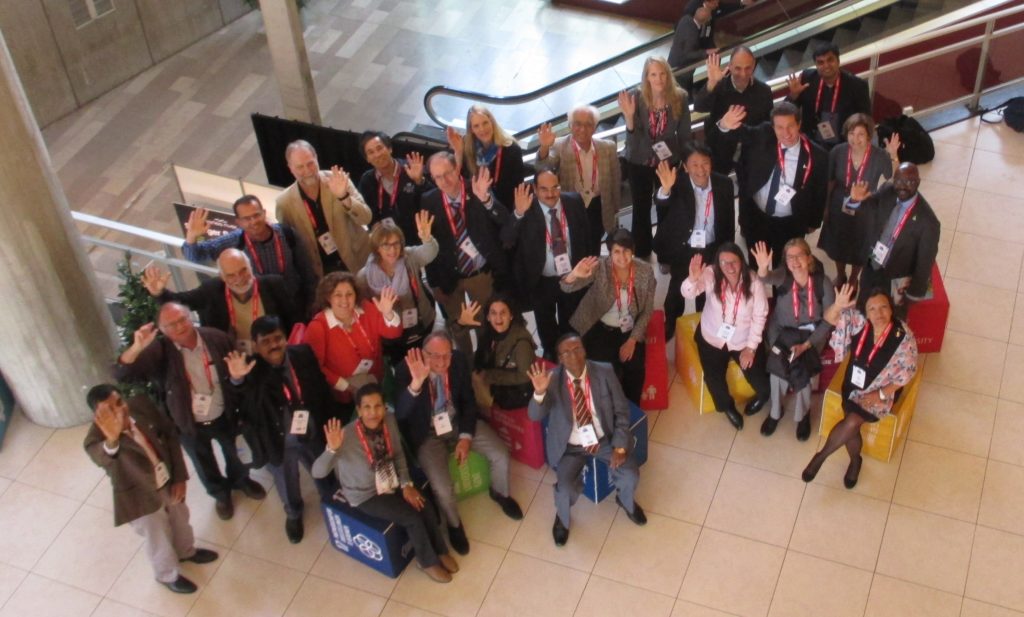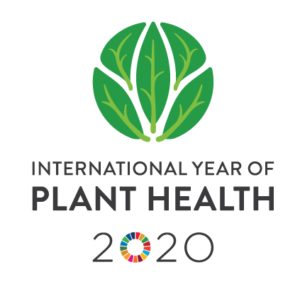
The IUPAC Advisory Committee on Crop Protection Chemistry (group photo below) is an international group of volunteers comprised of approximately thirty scientists from academia, industry, government, regulators and private consultancies dealing with crop protection, pesticides and their behavior in food and the environment.
The Committee is part of IUPAC Division VI, and we provide, via a project system, unbiased and timely authoritative reports and reviews on topical issues. IUPAC CropChem News is an effort to disseminate committee activities, share information on upcoming events in the crop protection community, and to increase cross-sector dialog on news and discoveries on crop protection.

Upcoming Community Events
8th Latin American Pesticide Residue Workshop, LAPRW-Online. May 18-20, 2021
72nd International Symposium on Crop Protection, 18 May 2021, Ghent, Belgium.
IUPAC World Chemistry Congress, 13-20 Aug 2021, Montreal, Canada
3th Arab Congress of Plant Protection, 31 Oct – 5 Nov, 2021, Hammamet, Tunisia
American Chemical Society Fall National Meeting, AGRO Division, 22-26 Aug 2021, Atlanta, Georgia, USA. AGRO is celebrating its 50th anniversary.
2021 Virtual NAPPO Annual Meeting, November 2021
Pacifichem, 16-21 Dec 2021, Honolulu, Hawaii
14th International Conference on Plant Pathogenic Bacteria, “The Impact of Plant Pathogenic Bacteria on Global Plant Health”, July 3-8, 2022, Assisi, Italy.
![]()
IUPAC Congress Comes to New Delhi in 2023
Since the first Congress held at Vienna in 1967, crop protection experts have been sharing their views and solutions on emerging issues in agriculture of global significance. However, the lack of understanding among various communities about crop protection chemicals still persists, with many export commodities being rejected by different countries. There is a need to tackle this issue both at a National and International level, bringing together various stakeholders on one platform. The 2023 Congress will be focused on following themes:
- Development of natural and synthetic agrochemicals
- Develop innovative pesticide formulations
- Emerging issues and stewardship
- Precise analytical techniques for environmental fate and metabolism
- Environmental fate and metabolism
- Soil microbiome, metabolomics
- Creation of awareness program on judicious use of plant protection chemicals

The 15th IUPAC International Congress on Crop Protection Chemistry will be hosted by the Society for the Promotion of Sustainable Agriculture (SPSA), in association with ICAR-Indian Agricultural Research Institute (IARI), New Delhi and Institute of Pesticide Formulation Technology (IPFT), Gurugram, and take place at National Agricultural Science Centre Complex (NASC Complex) in New Delhi, India.
 Contacts:
Contacts:
Dr. Najam Akhtar Shakil
Division of Agricultural Chemicals
ICAR-Indian Agricultural Research Institute
New Delhi-110012, India
E-mail: [email protected]

Dr. Jitendra Kumar
Director, Institute of Pesticide Formulation Technology
Department of Chemicals and Petrochemicals
M/o Chemicals and Fertilizers
Govt. of India
Email: [email protected]
![]()
IUPAC Project Highlights

The IUPAC Project “Inventory of Developments in the Field of RNAi-Based Pesticides and Potential Needs for International Harmonization of Regulatory Safety Requirements“, is led by Dr. Gijs Kleter of Wageningen Food Safety Research in Netherlands. He has recently published a mini-review paper in Pest Management Science.
Kleter, G. A. 2020. Food safety assessment of crops engineered with RNA interference and other methods to modulate expression of endogenous and plant pest genes. Pest Management Sci. https://doi.org/10.1002/ps.5957
Abstract: Genetically modified crops have been grown commercially for more than two decades. Some of these crops have been modified with genetic constructs that induce gene silencing through RNA interference (RNAi). The targets for this silencing action are genes, either specific endogenous ones of the host plant or those of particular pests or pathogens infesting these plants. Recently emerging new genetic tools enable precise DNA edits with the same silencing effect and have also increased our knowledge and insights into the mechanisms of RNAi. For the assessment of the safety of foodstuffs from crops modified with RNAi, internationally harmonized principles for risk assessment of foods derived from genetically modified crops can be followed. Special considerations may apply to the newly expressed silencing RNA molecules, such as their possible uptake by consumers and interference with expression of host genes, which, however, would need to overcome many barriers. Bioinformatics tools aid the prediction of possible interference by a given RNA molecule with the expression of genes with homologous sequences in the host crop and in other organisms, or possible off‐target edits in gene‐edited crops.

For more information, see an earlier paper published by Dr. Kleter:
Kleter, G. A., Kuiper, H.A., Kok, E.J. 2019. Gene-edited crops: towards a harmonized safety assessment, Trends in Biotechnol. https://doi.org/10.1016/j.tibtech.2018.11.014
Other Recent Papers on Plant Biotechnology
Arpaia et al., 2020. Biosafety of GM crop plants experessing dsRNA: data requirements and EU Regulatory considerations. Front. Plant Sci. https://doi.org/10.3389/fpls.2020.00940
Fletcher et al., 2020. A perspective on RNAi-based biopesticides. Front. Plant Sci. https://doi.org/10.3389/fpls.2020.00051
Stokstad, 2020. How a gene from grass-living fungus could save wheat crops worldwide. Science. doi:10.1126/science.abc1721
![]()
United Nations International Year Celebrations
 The United Nations has declared 2020 as the International Year of Plant Health (IYPH). “The year is a once in a lifetime opportunity to raise global awareness on how protecting plant health can help end hunger, reduce poverty, protect the environment, and boost economic development” However, the current COVID-19 epidemic has led to many events being postponed. Below are few of the upcoming events:
The United Nations has declared 2020 as the International Year of Plant Health (IYPH). “The year is a once in a lifetime opportunity to raise global awareness on how protecting plant health can help end hunger, reduce poverty, protect the environment, and boost economic development” However, the current COVID-19 epidemic has led to many events being postponed. Below are few of the upcoming events:
- International Plant Health Conference “Protecting Plant Health in a changing world” June 28 – July 1, 2021, Helsinki, Finland
- 26th International Congress of Entomology, July 18-23, 2021, Helsinki, Finland
- 14th International Conference on Plant Pathogenic Bacteria, “The Impact of Plant Pathogenic Bacteria on Global Plant Health” June, 6-11, 2021, Assisi, Italy
- 2021 NAPPO Annual Meeting and North American Safeguarding Conference, August 9, 2021, Washington, USA
- Plant Health, Agriculture & Bioscience Conference, Sept, 22-24, 2021, The Hague, Netherlands
![]()
Success Stories
A publication for testing the effects of herbicides on non-target terrestrial plants opens new inroads towards a tiered risk assessment, read Rena Isemer’s LinkedIn Story “NTTPs for Me Please”
Agro-technology: Film Farming is a hydrogel-membrane- and drip-irrigation-based agro-technology providing nutrients and water to the crop plant but fending off viruses and pathogens. Check out and example at Mebiol.
![]()
Funding Opportunities
Funding for Agri Businesses: Support for entrepreneurs and businesses is available through a wide range of EU programmes. Companies of any size or sector can benefit from this support. Deadline is 14 March 2021
![]()
Highlighted Publications
 Scientific advances and conceptual parallels between plants and mammals are discussed in the following papers. The highlight new perspectives in plant health, considering the plants as metaorganisms and the fields as agroecosystems.
Scientific advances and conceptual parallels between plants and mammals are discussed in the following papers. The highlight new perspectives in plant health, considering the plants as metaorganisms and the fields as agroecosystems.
Vryzas, 2016. The Plant as Metaorganism and Research on Next-Generation Systemic Pesticides – Prospects and Challenges. Frontiers in Microbiology. doi.org/10.3389/fmicb.2016.01968
Chen et al., 2020. A plant genetic network for preventing dysbiosis in the phyllosphere. Nature. doi.org/10.1038/s41586-020-2185-0
A review highlight latest development in the pesticide market:
Umetsu & Shirai, 2020 Development of novel pesticides in the 21st century. J. Pestic. Sci. https:doi.org/10.1584/jpestics.D20-201
![]()
Highlighted Podcasts
 AgTech 360 – This podcast takes a 360° view into emerging agriculture technologies by creating dialogue among stakeholders in academia, industry, growers, producers, Extension specialists, the overall agriculture sustainability community, and other important stakeholders.
AgTech 360 – This podcast takes a 360° view into emerging agriculture technologies by creating dialogue among stakeholders in academia, industry, growers, producers, Extension specialists, the overall agriculture sustainability community, and other important stakeholders.
Join host, Adrian Percy, as we present this information in an engaging format encompassing multiple viewpoints and more as we explore AgTech together. This podcast is sponsored by the North Carolina State Center of Excellence for Regulatory Science in Agriculture.
![]()
CropChem News contains regular sections on events, project highlights, selected articles, success stories and selected topics around new developments in crop protection and sustainable agriculture. Constructive feedback and recommendations are welcome.
Please contact the editorial team, led by Dr. Zisis Vryzas of Democritus University of Thrace if you have a news item.

If you are interested in becoming involved with the committee, please contact chair, Laura McConnell.

